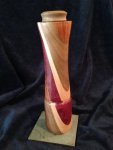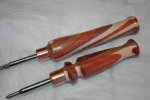The Penn State "Benjamins Best" are in roughly the same class without the uncertainty and allow you to buy onsies instead of a set so can actually be a bit cheaper.
As far as chisels it'll be hard to get three turners to agree on a starter set so take this for what its worth. My choices would be (based on what I use):
- 3/4" rouging gouge
- 3/8" spindle detail gouge
- 3/4" or 1" skew
- 5/8" bowl gouge
- 3/8" bowl gouge (this is also nice for detail spindle work as its very forgiving, hence two bowl gouges, I use both of them on bowls and spindle work - especially things like turned spoons)
- you'll eventually want a couple of scrapers - I use these a fair bit on the difficult parts of bowls: http://www.pennstateind.com/store/LCSIDE2.html
- If you're doing pens or really small stuff a smaller detail gouge or another detail gouge you can grind to a sharper point might be useful (I've ground some "skew gouges" out of allen wrenches that would quite nicely for tiny detial work as well) but I mostly use the skew for that.
I would also add to that list:
- a set of calipers
- a steb center drive center (more forgiving to start) I actually have a larger (1") and a small (1/2")
- if you don't have a face plate you'll want a face plate. something in the 3" range should handle pretty much most of what you want to do.
- You'll eventually want a chuck. Pick a chuck system because you'll want different jaw sizes/types and its nice to have a couple of chuck bodies you can use for all of the jaws. I've been pretty happy with the supernova2 from http://www.teknatool.com/ - they often have sales on refurbs http://www.novatoolsusa.com/Reconditioned-Products_c10.htm - my one SN2 is a refurb and looks just the same as the full priced one.
There's more of course

But that would get you started.

 The Harbor Freight HSS set I bought when I first started has been, too.
The Harbor Freight HSS set I bought when I first started has been, too. He's really quite good at it though... so its fun to watch. Its also interesting to see his finishing cuts where he tilts the scraper and gets a high sheer angle, I could argue that he's actually using the scraper more like a bowl skew there.. but I won't
He's really quite good at it though... so its fun to watch. Its also interesting to see his finishing cuts where he tilts the scraper and gets a high sheer angle, I could argue that he's actually using the scraper more like a bowl skew there.. but I won't 
